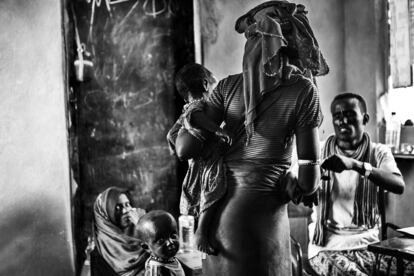Dagu: an afari version of the classic 'macuto radio'... and in serious use

Por Faith Schwieker-Miyandazi y Ken Hagiwara (adaptación de Fernando G. Calero, MSF)
African traditional forms of communication have evolved over time… as anywhere else in the world. In the olden days, different types of smoke signals were used to pass different messages, drums were beaten and horns blown to signify weddings, funerals, childbirth, naming rituals, harvest celebrations and other events. However, over time, these means have evolved and other ways of sharing information have appeared. A couple of months ago, our old friend Steve told us about a recent encounter with a Masaai Moran in full traditional attire, herding his cattle deep in a forest up the Ngorongoro highlands. And what’s so strange about that? You might ask. Well, to tell you the truth, up until this point of the story, everything could be considered quite normal but what shocked Steve was to see how this shepherd was going about his ancestral work while speaking on his mobile phone: “Up there! In the mountains! A Maasai Moran!” Steve explained using his arms to help draw the picture clearly for us.
Rural Afar is a very remote area where there is a severe dearth of health centres. Some of the functional health centres in the area like this one are supported by MSF. Photos: Juan Carlos Tomasi.
The anecdote that a surprised Steve told us and the very fact that just a decade ago such an experience would have been unthinkable and the feeling it gives you to know that now it is surely becoming a fully integrated reality in Maasai and many other communities. Moreover, nowadays we could say that this fact has been surpassed by time in that it’s normal to find posts in social networks like Twitter from all over the world, even from the most rural areas in Africa. Looking at the screen of Achol's I-pad screen, a fifteen year old friend of ours from South Sudan, we see a tweet from a Luo chief from Nyanza province in Kenya boasting of his second marriage to a village beauty, just next to it is another tweet from a Somali clan leader from Lower Jubba informing his “followers” of his son’s graduation from the University of Wales, and below that, tweets from millions of people all over Africa and the globe sending their best wishes for Madiba’s speedy recovery in South Africa. Some say globalisation brought us here; others think it was just a matter of time before that same evolution ended up trapping us. Whatever it is, it is true that technology has enhanced the exchange of information both in time and space, and that’s something that can be extrapolated to nearly all places in the world, well....nearly all, but not quite yet.
There are still some places in the world where things are done differently – out of the norm, and Afar in Ethiopia, is one such place. There, the lack of popular media like radio, television and internet, relatively common in many rural African settings, has not deterred communication. Deep in this north-eastern region of Ethiopia, where the Danakil desert ensures sandstorms are the norm in the hot dry season and where the rivers overflow flooding everything in the rainy season, people have devised their own way to communicate their news: dagu. Dagu is a system of sharing information fostered by the uniqueness of the setting, arising from the need to communicate in an area where living and climatic conditions are especially harsh and where there is high population mobility due to their nomadic lifestyle. Plus the unique clan and communal adminstrative methods that govern the Afari and the need to pass on wisdom to others in a setting that is particularly difficult for communications if it were to rely entirely on technology.
EAfar is an arid area bordered by the Danakil desert. The population here practices pastoral nomadism, hence the need for practical communication.
In Afar, timely communication may make the difference between life and death for its inhabitants and their livestock. For instance, if a storm is headed towards an area where large groups of pastoralists are grazing their animals, and the warning transmitted arrives late or is incomplete, many lives could be lost. This is because the rivers rise rapidly there and when this happens, lots of people and livestock are at risk of getting trapped and even losing their lives.
Furthermore, for people visiting Afar or those new to the region, information about weddings, births or deaths may be vital as it may constitute a security threat like a clan fight, and therefore a warning to avoid such areas. Consequently, for organisations like Médecins Sans Frontières, which we work for in the region, it is indispensable to be connected to dagu.
This video from Médecins Sans Frontières demonstrates clearly how just how tough life can be in this region:
How does dagu work?
If a disgruntled clan wants to make known their anger to another clan, near or far, they will use dagu through their leader. He (we use ‘he’ deliberately because the Afari are an especially patriarchal people, and most people in leadership positions are male) will speak to one person, an influential member of the clan community in their own right, who will then speak to another, and this one to others until the message reaches the target clan. The bearer of the information determines its weight. If the bearer of the information is a prominent person (according to the receiving clan) and the information he shares with them is ‘valid’, then the information will be handled quickly and cautiously, always keeping in mind its magnitude. At times information reaching a clan, a group, a person or an entity in the community might be deemed a mere rumour. However, even rumours have some truth according to the Afari and therefore lack of reaction will be understood as a confirmation of the rumour.
Regardless of its use, information passed through dagu is transmitted dynamically in a framework of invisible mechanisms, which enable those receiving it to react, respond and address the issue accordingly and in good time in order to prevent greater evils. Coping mechanisms in remote areas of the Afar region comprise three important aspects - legislative, customary and religious. In any case, a ‘wise’ decision must be made. And what kind of decision is considered ‘wise’? A wise decision is one that strikes a balance between Ethiopian law (the country’s laws), Afari customary law (a set of rules defined and accepted by the community) and Islamic sharia (the Afari are predominantly Muslim). And of course the decision taken must be convincing enough to be accepted by all parties as the best solution.
For example, if a fight between several individuals leads to the death of one of them, acording to the country’s law the killer must be handed over to the police. Although with this action it could be considered that they are abiding by the rules, in reality it could be that it isn’t so important for the Afari, as by only participating in this part of the process the community does not feel involved in it. Accordingly, to prevent the family of the deceased from retaliating, it is necessary to adopt religious and/or customary solutions that are recognised by the community as a whole. If the fight was based on religious reasons, then a Muslim judge (Qadi) or religious leader must intervene. If the individuals in question belong to different clans, then the two clans must find a solution in accordance with customary law. Solutions may include settlements like handing over a certain number of cows or camels, or both, or relocating the families of the people involved to separate them from each other until an amicable solution is reached. If an issue needs mediation, recognised mediators must be involved. Mediators could be community elders, religious leaders (such as the Imam), regional officials or influential individuals (rich or philanthropic community members) recognised by the community. One Afari local told us that if an amicable solution is not found, then the death of a clan member must be avenged. Until such time, the corpse must be preserved in an upright position, hence the presence of ‘standing tombs’ in the region.
For whatever purpose dagu is used, it is governed, inter alia, by the following rules: 1) anybody can transmit information, but the proper channels must be used, 2) manipulation of information is strictly prohibited as it can always be traced back to its source and the manipulators must be punished and expelled from the community, and 3) information shared through dagu must be beneficial to the community.
No matter how informal or invisible dagu may be, noncompliance can lead to dreadful disputes. In reality, modern technology has its advantages; the short time it takes to communicate complex information, the magnitude and variety of worldwide audiences that can be reached simultaneously, etc. However, we must not forget that the problems involved in information technology are also numerous, on top of the fact that, sometimes and in some places, it can fail completely. Nor must we forget that not all areas have internet coverage and some places even have limited access to TV and radio waves, while at times, in fact most of the time in rural areas, the energy needed to power electronic devices is not always available. Dagu might not be perfect, given that information can be lost or misinterpreted along the way or sometimes even disappear altogether, but we can’t deny that it is a perfectly functional means of communication.
By the way, if you haven’t already read it and are curious to learn more about life in Afar, we recommend you take a look at this excellent report published by El País Semanal a few days ago.
Tu suscripción se está usando en otro dispositivo
¿Quieres añadir otro usuario a tu suscripción?
Si continúas leyendo en este dispositivo, no se podrá leer en el otro.
FlechaTu suscripción se está usando en otro dispositivo y solo puedes acceder a EL PAÍS desde un dispositivo a la vez.
Si quieres compartir tu cuenta, cambia tu suscripción a la modalidad Premium, así podrás añadir otro usuario. Cada uno accederá con su propia cuenta de email, lo que os permitirá personalizar vuestra experiencia en EL PAÍS.
¿Tienes una suscripción de empresa? Accede aquí para contratar más cuentas.
En el caso de no saber quién está usando tu cuenta, te recomendamos cambiar tu contraseña aquí.
Si decides continuar compartiendo tu cuenta, este mensaje se mostrará en tu dispositivo y en el de la otra persona que está usando tu cuenta de forma indefinida, afectando a tu experiencia de lectura. Puedes consultar aquí los términos y condiciones de la suscripción digital.

























































